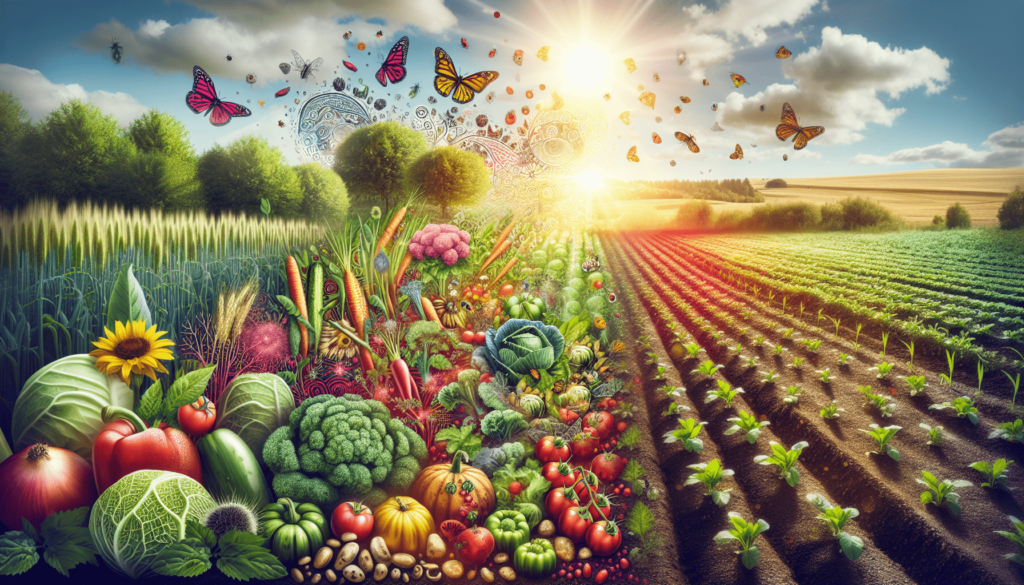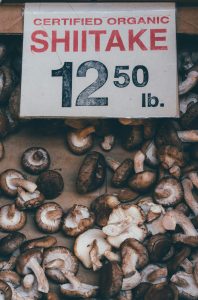Organic farming has long been praised for its environmental benefits and healthier produce, but skeptics have raised concerns about its ability to feed a growing global population. However, as the demand for sustainable agriculture continues to rise, the debate over organic farming’s ability to sustainably feed the world has gained momentum. This article explores the potential of organic farming to meet the growing food demands while minimizing harm to the planet, diving into its challenges and potential solutions. Join us as we embark on a journey to uncover the possibilities of organic farming as a sustainable solution for feeding the world.

Current Challenges of Conventional Agriculture
Use of Chemical Inputs
The use of chemical inputs in conventional agriculture has become a major concern due to its negative impact on the environment and human health. Pesticides, herbicides, and fertilizers are widely used to control pests, weeds, and boost crop yields. However, these chemicals can contaminate the soil, water, and air, leading to the pollution of ecosystems. Moreover, the overuse of synthetic fertilizers can deplete the nutrients in the soil, making it less fertile over time. It is crucial to address these challenges and find alternative approaches that are more sustainable.
Soil Degradation and Erosion
Conventional agriculture practices, such as intensive tillage and monocropping, have contributed to soil degradation and erosion. These practices disrupt the natural structure of the soil and leave it vulnerable to erosion by wind and water. As a result, fertile topsoil is lost, and the remaining soil becomes less productive. This not only affects the long-term viability of agricultural land but also contributes to sedimentation in water bodies, impairing their quality. Organic farming offers solutions to mitigate soil degradation and erosion through the implementation of practices that focus on building and maintaining soil health.
Water Pollution and Scarcity
The excessive use of chemical inputs in conventional agriculture also leads to water pollution and scarcity. Pesticides and fertilizers can leach into water bodies, contaminating drinking water sources and harming aquatic life. Additionally, conventional farming typically relies on irrigation, which can deplete water resources, especially in regions already facing water scarcity. In contrast, organic farming practices prioritize water conservation and reduce the risk of water pollution by utilizing natural methods of pest and weed control, and improving soil health to enhance water retention.
Loss of Biodiversity
Conventional agriculture has been associated with the loss of biodiversity due to the monoculture systems that prioritize the cultivation of a single crop over diverse ecosystems. This lack of diversity can disrupt natural habitats and reduce the availability of resources for beneficial organisms, such as pollinators and predators of pests. The use of chemical inputs in conventional farming further exacerbates the decline of biodiversity by harming non-target species. Organic farming, on the other hand, promotes biodiversity by encouraging crop rotation, intercropping, and creating habitats that attract beneficial insects and wildlife.
Principles of Organic Farming
Soil Health and Fertility
One of the fundamental principles of organic farming is the emphasis on soil health and fertility. Organic farmers prioritize the maintenance and enhancement of soil quality through practices such as composting, cover cropping, and the use of organic matter. By focusing on improving the soil’s structure, nutrient content, and biological activity, organic farmers create a strong foundation for healthy plant growth and sustainable agricultural systems.
Crop Rotation and Diversity
Crop rotation and diversity are key principles of organic farming that contribute to the long-term sustainability of agriculture. By alternating crops or plant species in a specific field over time, organic farmers can break disease cycles, manage pests and weeds naturally, and maintain soil fertility. This approach helps prevent the build-up of pests and diseases that can occur in monoculture systems while promoting a balanced ecosystem where beneficial organisms thrive.
Natural Pest and Weed Control
Organic farming takes a holistic approach to pest and weed control by utilizing natural methods. Instead of relying on synthetic pesticides and herbicides, organic farmers employ techniques such as integrated pest management (IPM), biological control, and crop rotation to manage pests and diseases. Similarly, weed control in organic farming is achieved through practices like mulching, hand-weeding, and the use of cover crops, reducing reliance on chemical herbicides.
Avoidance of Synthetic Chemicals
Avoidance of synthetic chemicals is a core principle of organic farming. Organic farmers refrain from using synthetic fertilizers, pesticides, herbicides, and genetically modified organisms (GMOs). By avoiding these inputs, organic farming promotes the use of natural and organic alternatives that are less harmful to the environment and human health. This principle ensures a more sustainable and ecologically-friendly approach to agriculture.

Sustainable Benefits of Organic Farming
Reduced Environmental Impact
Organic farming offers numerous benefits for the environment. By avoiding the use of synthetic chemicals, organic farmers reduce water and soil pollution, as well as the negative impacts on non-target organisms and ecosystems. Additionally, organic farming practices prioritize water conservation, reduce carbon emissions, and promote the preservation of biodiversity. These sustainable practices support the overall health and resilience of the environment.
Preservation of Soil Quality
Organic farming prioritizes the preservation and improvement of soil quality. Through the use of organic matter, cover crops, and proper crop rotation, organic farmers enhance soil fertility, structure, and biological activity. By maintaining healthy soils, organic farming helps prevent erosion, improve water retention, and sequester carbon, ensuring the long-term viability and productivity of agricultural land.
Conservation of Water Resources
Water conservation is a critical aspect of organic farming. Organic farmers employ practices such as drip irrigation, rainwater harvesting, and mulching to minimize water usage and prevent water wastage. By managing water resources efficiently, organic farming helps alleviate water scarcity, particularly in regions prone to droughts and limited water availability. This conservation approach ensures the sustainable use of water for agricultural production.
Protection and Enhancing Biodiversity
Organic farming plays a crucial role in protecting and enhancing biodiversity. By avoiding the use of synthetic pesticides and promoting diverse cropping systems, organic farmers create habitats that attract beneficial insects, birds, and other wildlife. These organisms contribute to natural pest control, pollination, and ecosystem balance, enhancing biodiversity on and around organic farms. This preservation of biodiversity is essential for the overall health and resilience of ecosystems.
Increasing Organic Production
Scaling Up Organic Farms
To meet the increasing demand for organic products and achieve a larger-scale transition to organic farming, it is necessary to scale up organic farms. This involves expanding the size and number of organic farms, as well as encouraging the conversion of conventional farms to organic practices. Scaling up organic farms requires support from policymakers, research institutions, and stakeholders to provide technical assistance, resources, and knowledge sharing.
Promoting Organic Certification
A crucial aspect of increasing organic production is promoting organic certification. Certification provides consumers with assurance that the products they purchase meet organic standards. It also allows farmers to access premium markets and benefit from price premiums. Government agencies and private organizations can play a significant role in promoting organic certification by providing incentives, education, and outreach programs to support farmers in obtaining and maintaining organic certification.
Education and Training
Education and training are essential for increasing organic production. Farmers need access to information on organic farming techniques, best practices, and innovative technologies. Training programs can empower farmers with the knowledge and skills needed to transition to organic farming successfully. Government agencies, universities, and NGOs can collaborate to develop comprehensive educational initiatives that cater to the specific needs and challenges of farmers interested in organic agriculture.
Government Support and Subsidies
Government support and subsidies play a vital role in facilitating the transition to organic farming. Governments can provide financial incentives, grants, and subsidies to farmers who adopt organic practices. These incentives can help offset the initial costs of transitioning to organic farming, as well as support ongoing organic production. Additionally, government policies can be implemented to create a favorable regulatory environment that encourages organic farming and ensures a level playing field for organic farmers.

Enhancing Productivity in Organic Farming
Innovative Farming Techniques
Innovative farming techniques are key to enhancing productivity in organic farming. Advances in technology and the development of improved farming practices can help organic farmers maximize yields while maintaining the principles of organic agriculture. Techniques such as precision agriculture, agroforestry, hydroponics, and vertical farming can be integrated into organic production systems, allowing for efficient resource utilization and optimized crop growth.
Use of Technology
The use of technology can greatly enhance productivity in organic farming. Digital tools, such as farm management software, weather monitoring systems, and remote sensing, can provide organic farmers with real-time data and analysis to make informed decisions. Additionally, the adoption of precision agriculture technologies, such as GPS-guided equipment and sensor-based irrigation systems, can optimize resource use and reduce waste. These technological advancements contribute to improving productivity and efficiency in organic farming.
Improved Seeds and Breeding
The availability of improved seeds and breeding techniques specifically adapted to organic farming is crucial for enhancing productivity. Organic farmers need access to varieties that perform well without the use of synthetic inputs. Plant breeding programs focused on organic farming can develop cultivars that prioritize disease and pest resistance, yield potential, and adaptability to organic management practices. By utilizing these improved seeds, organic farmers can achieve higher yields and optimize crop performance.
Sharing Best Practices
Sharing best practices among organic farmers is essential for enhancing productivity. Peer-to-peer learning platforms, farmer networks, and knowledge-sharing initiatives can facilitate the exchange of experiences, techniques, and solutions. Organic farmers can learn from each other’s successes and challenges, gaining valuable insights to enhance their own farming practices. Collaboration and the sharing of best practices contribute to continuous improvement and productivity gains in the organic farming community.
Addressing Concerns about Organic Farming
Yield Potential and Food Security
One common concern about organic farming is its perceived lower yield potential compared to conventional methods. Critics argue that organic farming may not be able to produce enough food to sustain a growing global population. However, numerous studies have shown that organic farming can achieve comparable yields to conventional farming, especially in diversified and well-managed systems. By implementing sustainable practices and leveraging innovative techniques, organic farming has the potential to contribute to global food security.
Availability and Accessibility
Another concern surrounding organic farming is the limited availability and accessibility of organic products. Currently, organic food tends to be more expensive and less readily available than conventionally produced food. However, as organic production scales up and demand increases, prices are expected to normalize. Government support and market incentives can further promote the availability and accessibility of organic products by encouraging the expansion of organic farms, fostering retail partnerships, and supporting local and regional distribution networks.
Higher Prices and Affordability
The higher prices of organic products are often a barrier for consumers. However, it is important to consider the true costs of conventional farming, including the environmental and health impacts associated with chemical inputs. With a shift towards sustainable agriculture, the costs of conventional methods may increase, leveling the playing field for organic products. Additionally, government support and subsidies for organic farming can help reduce production costs and make organic products more affordable for all consumers.
Scaling to Meet Global Demand
Meeting the growing global demand for organic products is a challenge that must be addressed. As consumer awareness of the importance of sustainable agriculture increases, the demand for organic food is expected to continue to rise. To scale up organic farming and meet this demand, collaboration between governments, farmers, researchers, and industry stakeholders is crucial. Investments in organic research and development, infrastructure, and market access are needed to ensure that organic farming can contribute to sustainable and resilient food systems on a global scale.

Successful Examples of Organic Farming
Sikkim, India
Sikkim, a state in India, has made remarkable progress in promoting organic farming. In 2016, Sikkim became the first state in the world to be certified as fully organic. The government of Sikkim implemented a systematic approach to transition all agricultural practices to organic methods, including the prohibition of synthetic fertilizers and pesticides. This initiative has not only improved the environmental conditions of the region but also boosted the local economy through the production of high-quality organic products.
Denmark
Denmark is another country that has successfully embraced organic farming. The Danish government has implemented policy measures to support organic agriculture, including financial incentives, research funding, and educational programs. As a result, Denmark has witnessed a significant increase in organic farming, with over 12% of the country’s agricultural land now dedicated to organic production. The Danish example demonstrates that a combination of government support, research collaboration, and market demand can drive the successful adoption of organic farming practices on a national scale.
Cuba
Cuba provides an inspiring example of organic farming in a challenging context. Due to limited access to chemical inputs during the post-Soviet era, Cuba was forced to shift towards organic agriculture. The country implemented innovative practices such as urban farming, agroecology, and permaculture to ensure food security and sustain agricultural production. Cuba’s organic farming success story demonstrates that organic agriculture can be a viable solution even in resource-constrained environments.
Bhutan
Bhutan, a small landlocked country in the Eastern Himalayas, has embraced organic farming as a key component of its national development strategy. Bhutan’s government has set a goal to become 100% organic by 2020, aiming to preserve its unique environment and cultural heritage. The transition to organic farming in Bhutan has been supported by strong government policies, education and training programs, and the active involvement of small-scale farmers. Bhutan’s commitment to organic farming showcases how a holistic approach to sustainability can be integrated into national development plans.
Potential Role of Organic Farming in Sustainable Food Systems
Integrated Crop-Livestock Systems
Organic farming can play a vital role in the development of integrated crop-livestock systems. By combining crop production with livestock farming, organic farmers can create a closed-loop system, where crop residues and manure become valuable inputs for organic fertilization. These integrated systems enhance nutrient cycling, reduce waste, and promote sustainable land use. Additionally, organic livestock production, which prohibits the use of antibiotics and growth hormones, aligns with the principles of animal welfare and environmental sustainability.
Local and Community Food Production
Promoting local and community-based food production is another potential role of organic farming in sustainable food systems. Organic farms can serve as hubs for local food production, supplying fresh and nutritious produce to nearby communities. By reducing the reliance on long-distance transportation and supporting local economies, organic farming contributes to a more resilient and sustainable food system. Community-supported agriculture (CSA) initiatives and farmers’ markets are examples of successful models that connect consumers directly with local organic producers.
Climate Change Mitigation
Organic farming has the potential to mitigate climate change by reducing greenhouse gas emissions and sequestering carbon in soils. Practices such as organic matter incorporation, cover cropping, and agroforestry increase carbon storage in soils, reducing the release of CO2 into the atmosphere. Furthermore, organic farming systems are less energy-intensive than conventional agriculture, contributing to a lower carbon footprint. By adopting organic farming practices on a larger scale, the agricultural sector can make a significant contribution to global climate change mitigation efforts.
Supporting Small-Scale Farmers
Organic farming can provide support to small-scale farmers by offering viable alternatives to conventional agriculture. Small-scale farmers often struggle to compete with larger industrial farms in terms of access to resources, market opportunities, and profitability. Organic farming, with its focus on sustainable practices, biodiversity, and local markets, provides a more inclusive and equitable approach to agriculture. By supporting small-scale farmers through training, technical assistance, and market access, organic farming can contribute to the economic development and food security of rural communities.
Collaboration and Knowledge Sharing
International Research and Partnerships
Collaboration and knowledge sharing through international research and partnerships are crucial for advancing organic farming practices. By fostering collaboration among researchers, institutions, and organizations worldwide, we can collectively address the challenges and opportunities of organic farming. International research projects can focus on topics such as sustainable soil management, organic crop breeding, and efficient pest and disease control methods. Sharing findings and best practices globally enables the continuous improvement and innovation of organic farming techniques.
Open Access to Information
Open access to information is essential for the development and dissemination of organic farming knowledge. By making research publications, technical reports, and educational resources freely available, we can empower farmers, researchers, and policymakers with the information needed to make informed decisions. Open access platforms and digital repositories play a vital role in facilitating knowledge sharing and ensuring that the benefits of organic farming are accessible to all.
Peer-to-Peer Learning Platforms
Peer-to-peer learning platforms provide a space for organic farmers to connect, exchange experiences, and learn from each other. These platforms can take the form of farmer networks, online forums, or community-based workshops. By creating opportunities for organic farmers to share their knowledge and best practices, we can foster a sense of community, promote innovation, and enhance productivity in organic farming.
Global Policy Coordination
Global policy coordination is necessary to promote organic farming and ensure its inclusion in sustainable food system strategies. International organizations and governing bodies can facilitate the development of common organic farming standards, harmonize certification processes, and advocate for supportive policies. By aligning policies and regulations across countries, we can create a favorable environment for organic farming, enhance market access, and encourage global collaboration towards sustainable agriculture.
Conclusion
Balancing organic farming and conventional methods is a crucial step towards sustainable food systems. By addressing the current challenges of conventional agriculture, embracing the principles of organic farming, and scaling up organic production, we can achieve a more sustainable and resilient agricultural system. Enhancing productivity in organic farming through technological advancements, improved seeds, and knowledge sharing is essential for meeting the growing global demand for organic products. Addressing concerns about organic farming, highlighting successful examples, and recognizing its potential role in sustainable food systems further strengthen the case for a transition towards organic agriculture. Collaboration, knowledge sharing, and the commitment of stakeholders at all levels are vital for realizing a hunger-free organic world. With a long-term commitment to sustainable farming practices, we can ensure a better future for both the environment and the well-being of future generations.




